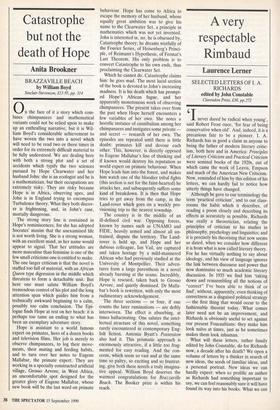A very respectable Rimbaud
Laurence Lerner
SELECTED LETTERS OF I. A. RICHARDS edited by John Constable Clarendon Press, £30, pp.272 61 never dared be radical when young', said Robert Frost once, 'for fear of being conservative when old'. And, indeed, it is a precarious fate to be a pioneer. I. A. Richards has as good a claim as anyone to being the father of modern literary critic- ism, both here and in America: Principles of Literary Criticism and Practical Criticism were seminal books of the 1920s, out of which came the work of Leavis, Empson and much of the American New Criticism. Now, reminded of him by this edition of his letters, we can hardly fail to notice how utterly things have changed.
Although he gave to our terminology the term 'practical criticism', and to our class- rooms the habit which it describes, of reading a poem closely and describing its effects as accurately as possible, Richards was really a theoretician, relating the principles of criticism to his studies in philosophy, psychology and linguistics; and it is precisely his theorising that now seems so dated, when we consider how different it is from what is now called literary theory. For he has virtually nothing to say about ideology, and his view of language ignores the link between discourse and power that now dominates so much academic literary discussion. In 1935 we find him 'taking down and reassembling all the notions of "correct" I've been able to think of or find', without, apparently, even thinking of correctness as a disguised political strategy — the first thing that would occur to the fashionable theorist today. What comes later need not be an improvement, and Richards is obviously useful to set against our present Foucaultians: they make him look naive at times, just as he sometimes makes them look inhuman.
What will these letters, rather fussily edited by John Constable, do for Richards now, a decade after his death? We open a volume of letters by a thinker in search of new ideas, the seeds of familiar ideas, and a personal portrait. New ideas we can hardly expect: when so prolific an author as Richards had something important to say, we can feel reasonably sure it will have found its way into his books. What we can expect, however, is indications — or re- minders — of some of the important emphases in his work, and there is plenty of that. We see how important the emo- tional life was to this rationalist, how deeply interested in modern literature he was, how happily married, how important to him the writing of poems in later life. Few men can have seemed less likely to start writing poetry in their sixties than this earnest intellectual, though the poems are in a way what you'd expect — dances of ideas, meticulously crafted in impeccable rhyme schemes, poems it is easy to admire but hard to be moved by.
The poems loom large in these letters: there are early drafts of some, requests for comments, and confessions that he feels guilty about 'indulging himself writing verses' instead of sticking to his last. The last he felt he ought to stick to, by that time, was not literary criticism but educa- tion, and in particular Basic English. In 1938, we learn, he was reluctant to go back to Cambridge 'to correct trimmings of miseducation': what he really wanted was to get on with his work on how best to teach English as a foreign language, and his 'American tinkerings with school antics'. 'Why shouldn't I be a Rimbaud of criticism?', he asked. He was a very respectable Rimbaud, not a trader in the Sahara but a Harvard professor writing poems, making television programmes on language, and climbing mountains (there is disappointingly little about Richards' mountaineering here — nothing to expand the wonderful essay he wrote in 1927 on 'The Lure of High Mountaineering').
Letters are records of friendships, and the most interesting friendship here is with T. S. Eliot. Eliot's letter-writing style can be astonishingly stuffy at moments (1 am venturing to send you herewith for inspec- tion and return a copy of most of a group of poems I have been working on'), and we would not expect any revelations about his own work from Old Possum, though there is an interesting remark, quoted in the notes, about The Confidential Clerk, which he fears is too gloomy: 'I don't want to be categorised as a pessimistic Christian of the type of Graham Greene'. Richards turns out to have known Eliot's poems intimate- ly ('Reading your latest poem aloud has been a favourite hobby with me'), and the praise he lavished was not just politeness, since he could be fiercely honest with poems he didn't like, always courteous but not sparing the poet's feelings. There is a splendid letter to Robert Lowell, which puts an unerring finger on the weaknesses of his later work, voicing objections many readers may have felt but few would put so bluntly:
The reiteration, the lacunae in connexity, the privacy of the allusions, the use of references which only the Ph. D. duties of the 1990s will explain, the recourse to contemporary crudi- ties, the 'it's enough if I say it' air . . .
— a splendid indictment not just of Lowell but of a good deal of contemporary poetry, the powerful voice of a radical reformer turned crusty old reactionary, of an enthus- iast for modernism drawing back when he feels it has left literature behind, of a scrupulous craftsman not afraid to speak his mind.



























































 Previous page
Previous page